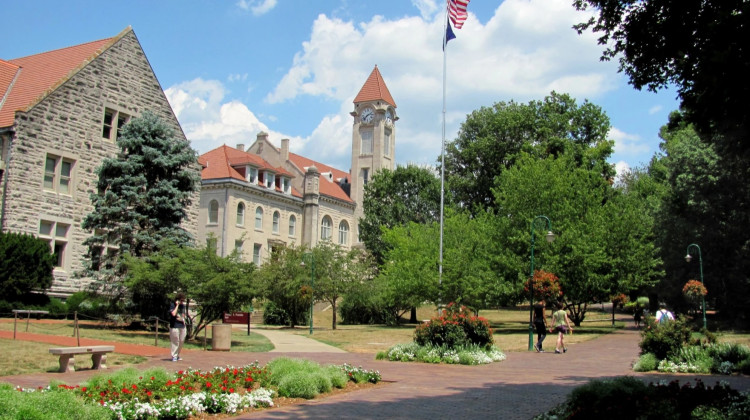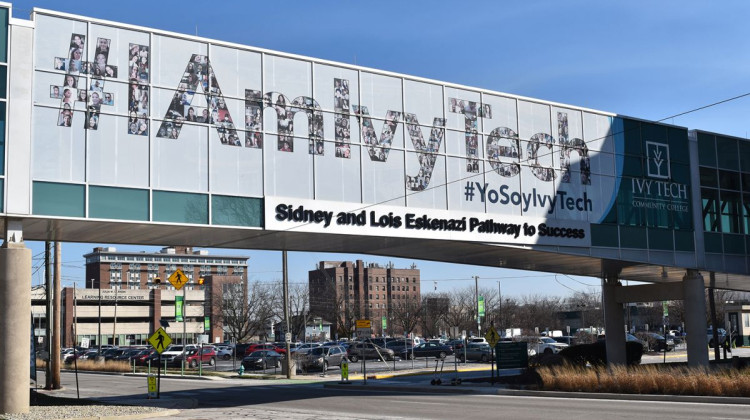
Indiana University leaders plans to cut, merge or suspend 116 degree programs offered at the Bloomington campus.
WFIU/WTIU NewsAfter Indiana University volunteered to cut, merge or suspend 249 degrees to comply with a new law, faculty are wondering what comes next.
The new law requires the elimination of programs with small numbers of graduates. The new degree thresholds were added to the state budget shortly before it passed. It took effect Tuesday.
GOP leaders say the change streamlines education and provides better connections to careers. But some faculty don’t see the logic.
Alex Lichtenstein, chair of IU’s American studies department, said IU has always been a university which offers dozens of programs for Hoosier students — even students with niche interests.
“It's precisely the fact that these are small majors that makes them good, and that makes IU great,” Lichtenstein said. “In my view, it's a different kind of institution, and you're cheating the students. You're cheating the students out of the opportunity to discover something that they never knew they might be interested in.”
The Commission for Higher Education announced the cuts Monday, though IU said it had been working with deans and unit administrators to identify programs below the threshold.
“The state is clearly trying to micromanage the university and trying to transform the university,” said Alexus McLeod, professor of religious studies. “One thing I wish we saw from the university is more questioning of that, maybe more resistance to that.”
The cuts and mergers touch many IU departments, including the sciences, arts, humanities, education, foreign languages and mathematics.
Lichtenstein said massive changes, such as cutting multiple degree programs, usually take months of discussion and research.
“None of that was done," Lichtenstein said. "This was all implemented, essentially, in the last three to four weeks."
Indiana colleges cut more than 400 programs to comply with new law
Legislators added the new requirements to the state budget without public debate or discussion.
Indiana’s public universities and colleges had to comply with program minimums set by legislators, including:
- 15 degrees awarded for undergraduate programs
- 7 degrees awarded for master’s programs
- 3 degrees award for doctorate programs
Across the state, colleges cut more than 400 degree programs, or about 19 percent. The changes will be finalized this month.
Lichtenstein said the origin of the minimum numbers is unclear.
“Did they invent it?” Lichtenstein said. “There was no indication that any thought went into this.”
To create new programs or continue ones that do not meet thresholds, colleges must receive permission from the Commission for Higher Education. If colleges don’t get permission, they must eliminate the program and its costs.
Some faculty worry that “eliminating costs” associated with their program means they could lose their jobs, though the law doesn’t outright require universities to terminate faculty.
“The main cost that you have in that program, other than administration or secretaries, is faculty,” McLeod said. “So, it wouldn't really eliminate costs to merge us into different departments, if you're going to keep everyone.”
The changes came as government officials want to align higher education with the state’s economy.
Gov. Mike Braun celebrated the changes, saying it will “ensure there is a direct connection between the skills students are gaining through higher education and the skills they need most.”
Indiana Commissioner for Higher Education Chris Lowery also said the changes will benefit students and fit the needs of Indiana’s economy. He said Indiana’s universities have set a national example.
“The thoughtful, voluntary review and reduction conducted by Indiana’s public institutions demonstrates their commitment to improving quality, cost, and delivery while strategically allocating resources,” Lowry said in a release.
But McLeod said politicians can’t predict which fields are going to be in demand.
“It's very short sighted,” McLeod said. “If you cut programs, it's not straightforward to just restart those programs right away. I mean, 10, 15 years ago, no one knew that AI would be such a huge thing today.”
IU plans to change more than 200 programs
IU cut more programs than any other college. Leaders volunteered about 115 programs at IU Bloomington alone.
An IU spokesperson said if the cuts, mergers and consolidations are approved, it would result in a net loss of 222 programs across all campuses.
Some programs at IU will be eliminated, including those without any students. Other programs may be merged into new or existing programs.
For example, certain B.S. Ed. programs had no students enrolled, wrote IU School of Education Dean Robert Berry in an obtained email.
“These programs are now merged as individual tracks under the broader B.S.Ed. in Secondary Education umbrella," Berry wrote. “While these tracks were created years ago to reflect subject-specific pathways, the degree programs were never formally closed, leading to misunderstandings.”
The university will “teach-out” suspended programs, meaning students can still finish their degrees.
For Lichtenstein and McLeod, they’re waiting to see exactly what it means to work in a discontinued program.
Lichtenstein said faculty may continue as they had been — with separate budgets, the same classes and their own curriculum. But, faculty still fear their units or their jobs could disappear.
“I think some communication, or any, would be good,” McLeod said. “It's certainly better than what we're getting now, which is essentially nothing.”
The impact may spread beyond the degrees cut.
Though students may not have met the state’s threshold, Lichtenstein said hundreds still took American Studies classes.
“One thing I keep reading is, these are ‘under-enrolled majors,’” Lichtenstein said. “They're not under-enrolled. They just don't have a large number of majors.”
Other departments will only offer advanced degrees, such as the religious studies program. Options are going to shrink, McLeod said.
“Which will be, simply, less for the students to gain at a university like this, where many students come in order to have those kinds of opportunities that they wouldn't have at a smaller university,” McLeod said.
Aubrey is our higher education reporter and a Report For America corps member. Contact her at aubmwrig@iu.edu or follow her on X @aubreymwright.
 DONATE
DONATE








 Support WFYI. We can't do it without you.
Support WFYI. We can't do it without you.